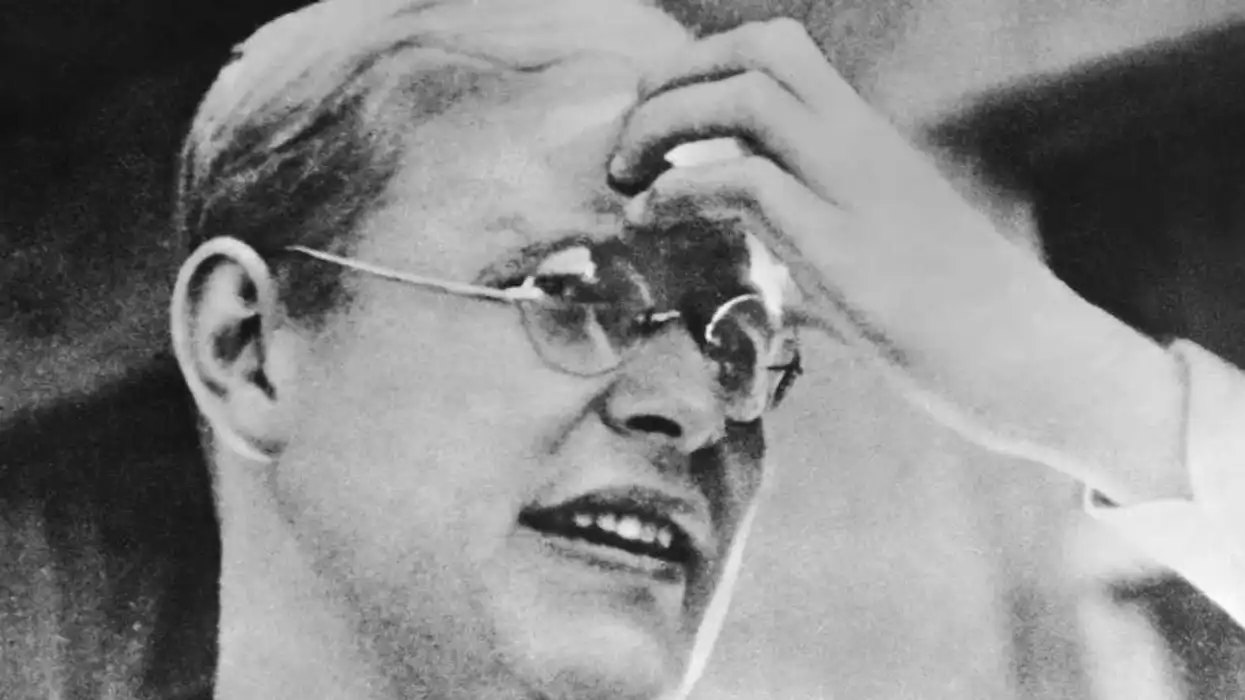
© 2026 Blaze Media LLC. All rights reserved.
"The key to economic growth is not acquisition of things by the pursuit of monetary rewards but the expansion of wealth through learning and discovery."
The below quotes come from pioneering economist, futurist, venture-capitalist and Reagan's most-quoted living author, to go along with numerous other titles and awards, George Gilder's 2013 "Knowledge and Power: The Information Theory of Capitalism and How it is Revolutionizing our World."

If the below quote, representative of Gilder's economic theory speaks to you, you will want to read on:
"The war between the centrifuge of knowledge and the centripetal pull of power remains the prime conflict in all economies. Reconciling the two impulses is a new economics, an economics that puts free will and the innovating entrepreneur not on the periphery but at the center of the system. It is an economics of surprise that distributes power as it extends knowledge. It is an economics of disequilibrium and disruption that tests its inventions in the crucible of a competitive marketplace. It is an economics that accords with the constantly surprising fluctuations of our lives."
All emphasis is ours. (As an aside, if you like this piece, be sure to check out Gilder's book recommendations too!)
1. Knowledge and power "At the heart of capitalism is the unification of knowledge and power. As Friedrich Hayek, the leader of the Austrian school of economics, put it, “To assume all the knowledge to be given to a single mind…is to disregard everything that is important and significant in the real world.” Because knowledge is dispersed, power must be as well."
2. Human diversity and free markets "Enforced by genetics, sexual reproduction, perspective, and experience, the most manifest characteristic of human beings is their diversity. The freer an economy is, the more this human diversity of knowledge will be manifested. By contrast, political power originates in top-down processes—governments, monopolies, regulators, and elite institutions— all attempting to quell human diversity and impose order. Thus power always seeks centralization."
3. Knowledge and power part two "The war between the centrifuge of knowledge and the centripetal pull of power remains the prime conflict in all economies. Reconciling the two impulses is a new economics, an economics that puts free will and the innovating entrepreneur not on the periphery but at the center of the system. It is an economics of surprise that distributes power as it extends knowledge. It is an economics of disequilibrium and disruption that tests its inventions in the crucible of a competitive marketplace. It is an economics that accords with the constantly surprising fluctuations of our lives."
4. Knowledge and power part three "Explicitly focusing on knowledge and power allows us to transcend rancorous charges of socialism and fascism, greed and graft, “voodoo economics” and “trickle-down” theory, callous austerity and wanton prodigality, conservative dogmatism and libertarian license. We begin with the proposition that capitalism is not chiefly an incentive system but an information system...We continue with the recognition, explained by the most powerful science of the epoch, that information itself is best defined as surprise— what we cannot predict rather than what we can. The key to economic growth is not acquisition of things by the pursuit of monetary rewards but the expansion of wealth through learning and discovery. The economy grows not by manipulating greed and fear through bribes and punishments but by accumulating surprising knowledge through the conduct of the falsifiable experiments of free enterprises. Crucial to this learning process is the possibility of failure and bankruptcy."
5. The primacy of information "Because the system is based more on ideas than on incentives, it is not a process that is changeable only over generations of Sisyphean effort. An economy is a “noosphere” (a mind-based system), and it can revive as quickly as minds and policies can change. That new economics— the information theory of capitalism— is already at work in disguise. Concealed behind an elaborate mathematical apparatus, sequestered by its creators in what is called information technology, the new theory drives the most powerful machines and networks of the era. Information theory treats human creations or communications as transmissions through a channel, whether a wire or the world, in the face of the power of noise, and gauges the outcomes by their news or surprise, defined as “entropy” and consummated as knowledge. Now it is ready to come out into the open and to transform economics as it has already transformed the world economy itself."
6. Entrepreneurs and the information economy "In an information economy, entrepreneurs master the science of information in order to overcome the laws of the purely physical sciences. They can succeed because of the surprising power of the laws of information, which are conducive to human creativity. The central concept of information theory is a measure of freedom of choice. The principle of matter, on the other hand, is not liberty but limitation— it has weight and occupies space."
7. Disequilibrium and disorder over equilibrium and spontaneous order "From the equilibrium and spontaneous order of Adam Smith and his heirs, from invisible-handed markets and perfect competition, supply and demand, and rewards and punishments, I was pushed to theories of disequilibrium and disorder, and information and noise, as the keys to understanding economic progress."
8. The crisis of information "In its full flower, information theory is densely complex and mathematical. But its implications for economics can be expressed in a number of simple and intelligible propositions. All information is surprise; only surprise qualifies as information. This is the fundamental axiom of information theory. Information is the change between what we knew before the transmission and what we know after it. From Adam Smith’s day to ours, economics has focused on the nature of economic order. Much of the work of classical and neo-classical economists was devoted to observing the mechanisms by which markets, confronted with change— especially change in prices— restored a new order, a new equilibrium. Smith and his successors followed in the footsteps of Newton and Leibniz, constructing a science of systems. What they lacked was a science of disorder and randomness, a mathematics of innovation, a rigorous measure and mandate for freedom of choice. For economics, the relevant science has arrived just in time. The great economic crisis of our day, a crisis of theory as well as practice, is a crisis of information. It can be grasped and resolved only by an economics of information."
9. Entropy and noise "One fundamental principle of information theory distills all these considerations: the transmission of a high-entropy, surprising product requires a low-entropy, unsurprising channel largely free of interference. Interference can come from many sources. Acts of God like tsunamis and hurricanes have been known to do the job, though otherwise vigorous economies quickly recover from these disasters. For a particular entrepreneurial idea, interference may come in the form of a more powerful competing technology. The most common and destructive source of noise, however, is precisely the institution on which we most depend to provide a clear and stable channel in the first place. When government either neglects its role as guardian of the channel or, worse, tries to help by becoming a transmitter and turning up the power on certain favored signals, the noise can be deafening."
10. Profits "Profits differentiate between the normally predictable yield of commodities and the unexpected returns of creativity. The entrepreneur’s new product or business surprises the economy, and his payback will be surprising— it will disrupt the equilibrium of the existing order. If established companies can manipulate the channel to protect their own products, businesses, and margins, a new product cannot pass through. The unexpected financial profit is surprisal or entropy— what Peter Drucker called an “upside surprise.” Drucker pointed out that most measured financial “profits” are not real in this sense. They merely cover the cost of capital— the return of interest. Innovation is the source of real profit, entropic profit, which derives from the upside surprises of entrepreneurial creativity. In order for the entrepreneur to succeed, he must know that, if his creation generates an upside surprise, the related profits will not be confiscated or taxed away. If they may be confiscated, his entire project will not be able to attract the necessary resources to bring it to market."
11. Innovation, surprise and profit "Linking innovation, surprise, and profit, Shannon’s entropy is the heart of the economics of information theory. Signaling the arrival of an invention or disruptive innovation is first its surprisal, then its yield beyond the interest rate— its profit, a further form of Shannon’s entropy. As the market absorbs a new product, however, its entropy declines until its margins converge with prevailing risk-adjusted interest rates. The entrepreneur must then move on to new surprises. The economics of entropy describe the process by which the entrepreneur translates the idea in his imagination into a practical form. In those visionary realms, entropy is essentially infinite and unconstrained and thus irrelevant to economic models. But to make what he has imagined practical, the entrepreneur must make specific choices among existing resources and strategic possibilities. Entropy here signifies his freedom of choice. As Shannon understood, the creation process itself defies every logical and mathematical system. It springs not from secure knowledge but from falsifiable tests of commercial hypotheses. It is not an expression of past knowledge but of the fertility of consciousness, will, discipline, imagination, and art."
12. The primacy of entrepreneurs "The key force of economic advance is the entrepreneur, who on his own, without governmental cues or expert consultation or even a defined market, creates new goods, services, business plans, and projects. Economic growth and progress, jobs and welfare, markets and demand all stem from this creativity of the entrepreneur. Population growth, capital accumulation, economic efficiency, and even scientific advances are all less important than entrepreneurial creativity...Failing to see the centrality of entrepreneurial creativity, economists everywhere have counseled governments to attend to the money supply, aggregate demand, consumer confidence, trade imbalances, budget deficits, capital flows— to attend to everything except what matters most: the environment for innovation."
13. Adam Smith and Hayek were wrong? "In the end, Smith was the greatest defender of free enterprise and open systems and untrammeled trade between free peoples. But in his system, entrepreneurial creation is subsumed under the rubric of the “division of labor”— the extent of which, so he ordained, “is determined by the extent of the market.” That there is no market without entrepreneurs passed unnoticed in the two centuries that followed Smith’s work. Even the Austrian titan Friedrich Hayek missed it in his valiant defense of free markets after World War II. Among advocates of free markets, Hayek’s “spontaneous order” remains the prevailing image of economic organization. Amid all that spontaneous order and economic equilibrium, however, entrepreneurs and their creations continued to crop up disruptively."
14. Risk-taking is more important than ever before "This attitude toward enterprise, which puts the equilibrium of markets first and looks forward to disruptive innovators withering away, has produced the current economic crisis and the crisis of economic thought. For contrary to every economic theory of a stationary state, a new industrial state, or an eclipse of capital, the role of entrepreneurial risk-taking is more important than ever before. In 2010, companies launched by entrepreneurs backed by venture capital generated over a fifth of America’s gross domestic product. In that same year, companies less than five years old created all of the new jobs. (The older ones actually shed jobs.)"
15. The overthrow of equilibrium "The most important feature of an information economy, in which information is defined as surprise, is the overthrow, not the attainment, of equilibrium. The science that we have come to know as information theory establishes the supremacy of the entrepreneur because it appreciates the powerful connection between destruction and what Schumpeter described as “creative destruction,” between chaos and creativity."
16. The stock market "In order to understand the movement of prices, you need not an oscilloscope to measure the entire market and reduce it to noise, but a microscope to investigate the creative process behind every company and its price."
17. Inventions, entropy and the supply side Entrepreneurship is devoted to creation of new goods and services. Creativity is always surprising. That is why it cannot be planned or demanded by governments or even by customers. As Steve Jobs put it, explaining his contempt for market surveys, “It’s really hard to design products by focus groups. A lot of times, people don’t know what they want until you show it to them.” As Henry Ford said many years earlier: “If I had listened to my customers, I would have built a faster horse.” Inventions in general express Shannon entropy. They come from the supply side.
18. Capitalism "Entropy is a measure of surprise, disorder, randomness, noise, disequilibrium, and complexity. It is a measure of freedom of choice. Its economic fruits are creativity and profit. Its opposites are predictability, order, low complexity, determinism, equilibrium, and tyranny. Predictability and order are not spontaneous and cannot be left to an invisible hand. It takes a low-entropy carrier (no surprises) to bear high-entropy information (full of surprisal). In capitalism, the predictable carriers are the rule of law, the maintenance of order, the defense of property rights, the reliability and restraint of regulation, the transparency of accounts, the stability of money, the discipline and futurity of family life, and a level of taxation commensurate with a modest and predictable role of government. These low-entropy carriers do not emerge spontaneously. They are the effects of political leadership and sacrifice, prudence and forbearance, wisdom and courage. Sometimes they must be defended by military force. They originated historically in a religious faith in the transcendent order of the universe. They embody a hierarchic principle. It is these low-entropy carriers that enable the high-entropy creations of successful capitalism."
19. The brilliance of Bain and mistakes of presidents Carter and Obama "Bain and Andrews explained to me that tax-rate reductions were just a special case of the strategy of aggressive price cutting on which Bain had based much of its consulting practice. Bain itself would often do its first project for free. “We have discovered,” Bain said, “that aggressive price cuts can trigger a cascade of strategic benefits, not just expanding market share, building asset values, and increasing revenues and profits, but also gaining more knowledge of the strategic environment and provoking overreactions and blunders by rivals.” “Companies in trouble that raise their prices, on the other hand,” Bain explained, “all too often begin a spiral of decline.” The market darkens before them as they retreat from it into highly paid niches. Their technological progress slows as their volumes decline and rivals rush ahead into the future. Bain saw the United States under President Carter as a company in trouble that was raising its prices in response, with all the predictable bad effects, such as competitive losses to Japan and Germany, lower real revenues for the government, collapsing equity values and the famous “national malaise.” The pattern is being repeated today under Obama."
20. What is the real value of a company? "Generalized as the “experience curve,” the theory holds that— largely because of on-the-job learning, broadly considered— the cost of producing any good or service declines by between 20 percent and 30 percent with every doubling of units sold. Growing apace with output and sales is entrepreneurial knowledge, which springs from improvements in every facet of the company; every manufacturing process; every detail of design, marketing, and management. Crucially, the curve extends to customers, who learn how to use the product and multiply applications for it as it drops in price. The root of a company’s value, then, is experience, which is a product of the knowledge in the company, the learning of the customers, the balance sheet of assets and liabilities, and, not least, the policy environment. Private equity investment firms like Bain Capital work on all these levels to achieve capital gains. The experience curve charts the increase in prowess with experience and scale in the provision of any product, from pins to cookies, insurance policies to phone calls, pork bellies to chicken broilers, steel ingots to airplanes. But if you raise prices— or taxes—you slow down all this learning and experience, increasing average costs across a business and an economy, depleting asset values, exacerbating liabilities, and lowering both private profits and public revenues. Government becomes more powerful in relation to the private sector, although weaker in relation to the world."
21. Wherefrom does economic growth spring? "Economic growth springs not chiefly from incentives—carrots and sticks, rewards and punishments for workers and entrepreneurs. The incentive theory of capitalism allows its critics to depict it as an inhumane scheme of clever manipulation of human needs and hungers scarcely superior to the more benign forms of slavery. Wealth actually springs from the expansion of information and learning, profits and creativity that enhance the human qualities of its beneficiaries as it enriches them. Workers’ learning increasingly compensates for their labor, which imparts knowledge as it extracts work. Joining knowledge and power, capitalism focuses on the entropy of human minds and the benefits of freedom. Thus it is the most humane of all economic systems."
22. Innovation "Entrepreneurial innovation extends the market to the boundaries of human activity. Just as every human being today could, theoretically, own a cheap printer, every human being in the coming era will be able to possess a manufacturing printer. In the climax of the industrial revolution, goods and services will be digitally virtualized and specialized for each individual user. Capturing the explosive increase in efficiency resulting from such virtualization— mixing mind and matter, information and energy— is once again the experience curve. Governing both parts of the mixture of information and energy is entropy. Informational entropy measures the content of a message through the “news” or surprises it contains— the number of unexpected bits. The “division of labor” is measured by this entropy: the more specialized the production, the more the entropy and the market extend. High-entropy inventions capture the eureka moments of enterprise— the light turning on in the mind that enables the next new thing. Surprising high-entropy breakthroughs win the economic glory. But for the guts of a full experience curve, you also need routinized production. While in communications you want unexpected news (high entropy), in a mass manufacturing process you want predictability (low entropy)."
23. Against spontaneous order "Things that are growing and changing are by definition high in entropy. Moving from a settled past into an undetermined future, they are always defined by their information, their news, their surprises. Spontaneous order is self-contradictory. Spontaneity connotes the ebullition of surprises. It is highly entropic and disorderly. It is entrepreneurial and complex. Order connotes predictability and equilibrium. It is what is not spontaneous. It includes moral codes, constitutional restraints, personal disciplines, educational integrity, predictable laws, reliable courts, stable money, trustworthy finance, strong families, dependable defense, and police powers. Order requires political guidance, sovereignty, and leadership. It normally entails religious beliefs. The entire saga of the history of the West conveys the courage and sacrifice necessary to enforce and defend these values against their enemies."
24. Statists versus anarchists "Politicians and regulators make high -entropy interventions for the interests of their cronies. Lawyers exploit the law for the advantage of the bar. Incumbent legislators punish those who fund their challengers. Tax rates creep up, stultifying learning curves and destroying the information fabric of entrepreneurship. Mobs rise up in envy and indignation to attack successful ethnic or religious groups, like Jews or Mormons, as well as “the rich.” The key misconception of the popular versions of libertarian and Austrian economics is that political order can be spontaneous— that capitalism can thrive in anarchy. But central to the Austrian model is the power of prices for signaling economic conditions. Without the government’s enforcement of property rights and contracts and its maintenance of defense and a monetary system, the carrier fills up with noise. Information theory defines entropy as freedom of choice and surprise. It is intrinsically libertarian in its implications. But it does not presuppose libertarian anarchy. Legal codes and moral practices do not spring spontaneously from the interplay of the marketplace or from the self-interested conflicts of individuals. Progress in law and order does not spring from a Darwinian process of natural selection among random mutations. It is achieved through a heroic struggle to develop civilized institutions and defend them. Building these institutions are leaders, political and intellectual. The quality of political leadership is crucial to the development and defense of markets, and there is nothing spontaneous about it. The low-entropy side of the economy is demand and predictability; the high-entropy side is supply and surprise. Government and law are on the low-entropy side; they favor and foster rules of order. On the high-entropy side are entrepreneurship and spontaneity, the domains of creativity and surprise. Spontaneous order is an oxymoron that violates the fundamentals of any information system."
25. Entropy is freedom of choice "Entropy is Janus-faced. Its upside surprises are redemptive and favorable to freedom. It is freedom of choice. But the carrier itself requires constant vigilance against entropic noise. Order is not spontaneous, but it is a necessary condition for all the surprises of freedom and opportunity."
26. Against materialism "Entrepreneurial creation is the generation, de novo, of novelty and surprise— freedom of choice originating in the world of ideas, and imagination beyond all concern with chemicals. The contrary view— that all ideas are determined by material relationships— is the materialist superstition."
27. Economic activity Economic activity is not iterative or ergodic; it constantly changes. It is entropic, full of surprises. Businesses can never assume that doing the same thing— producing the same goods and services for decades— will ensure survival. Economic activity is not dominated by the material environment; its purpose is often to transform its environment through the application of new ideas and breakthroughs. It is not gradualist; it makes huge speculative and inventive leaps. It shows little monotonicity— what works on one occasion might fail on another. It is not local in time or space; it is not restricted to the so-called “adjacent possible”; its enterprises reach around the world and are deeply affected by remote developments and projected outcomes. The power in capitalism must not be mindless. Unless it is combined with knowledge, mere economic power or money is fruitless. Enterprise involves memory of the past and anticipation of the future, and it is creative. It is not a simple incentive system of rewards and punishments, of carrots and sticks. It is an information system, and it is governed less by economic theory as we know it than by information theory. The beautiful congruence of information theory with a capitalist economy, the creative convergence of knowledge with power, has been the main subject of this book. Knowledge is about the past. Entrepreneurship is about the future. We are connected to the past by our memories and to the future by our choices. Information theory moves from the future to the past, while physical theory moves from the past to the future. Events are determined by physical causes from the past and by subjective choices from the future. The entrepreneur surfs the crests of creation in between.
28. Why this all matters "At a time when conservatives and liberals, libertarians and authoritarians battle in the arena of ideas, information theory offers a redemptive synthesis. The low-entropy carriers that conservatives uphold of law, property, family, and morality enable the high-entropy creations of science and entrepreneurship. Information theory tells us that order is not spontaneous; information is not perfect; playing fields are not level; property rights and human rights are not automatic. They must be upheld and fulfilled by culture, religion, and politics. But information theory is also a mandate of liberty, enshrining freedom of choice as its deepest law of entropy and creativity."
Want to leave a tip?
We answer to you. Help keep our content free of advertisers and big tech censorship by leaving a tip today.
Want to join the conversation?
Already a subscriber?
Ben Weingarten is a writer, commentator, and editor at large at RealClearInvestigations. He is a senior contributor at the Federalist and writes columns for Newsweek and the Epoch Times.
Ben Weingarten
Ben Weingarten is a writer, commentator, and editor at large at RealClearInvestigations. He is a senior contributor at the Federalist and writes columns for Newsweek and the Epoch Times.
more stories
Sign up for the Blaze newsletter
By signing up, you agree to our Privacy Policy and Terms of Use, and agree to receive content that may sometimes include advertisements. You may opt out at any time.
Related Content
© 2026 Blaze Media LLC. All rights reserved.
Get the stories that matter most delivered directly to your inbox.
By signing up, you agree to our Privacy Policy and Terms of Use, and agree to receive content that may sometimes include advertisements. You may opt out at any time.






